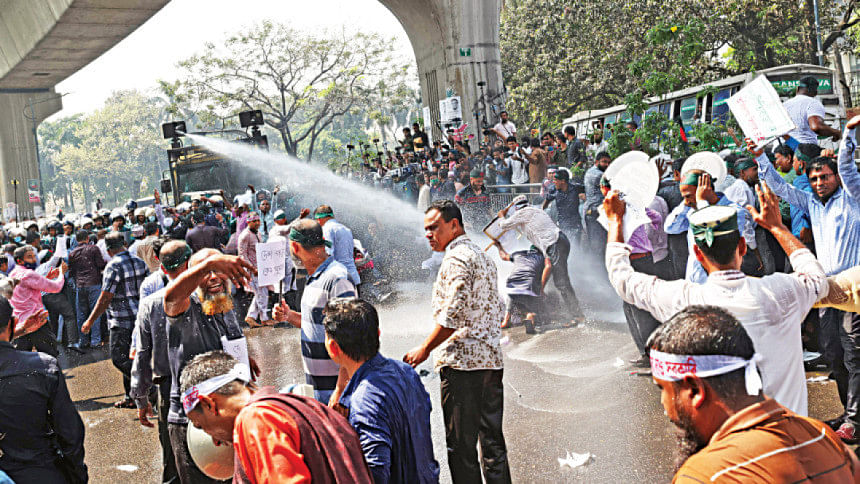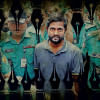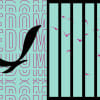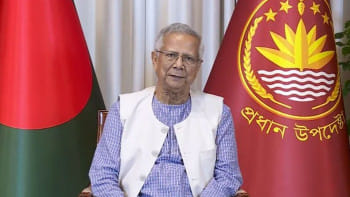Bangladesh’s civic and digital arenas are becoming fear zones

Bangladesh has a long history of people rising and making their voices heard, especially in the face of authoritarian rule. Time and again, the streets have echoed with one clear demand: the right to speak freely, to gather peacefully, and to stand together for change. These basic freedoms are not just the heart of any real democracy but also what SDG 16 (peace, justice and strong institutions) is all about.
Within the framework of Sustainable Development Goal (SDG) 16, "digital and civic space" refers to the online and offline environments where individuals and groups can freely express themselves, associate, and participate in public life. It lays the groundwork for accessing information, participating in decision-making processes, and promoting accountability and inclusive governance. Journalists, by the very nature of their profession, play a critical role in holding power to account—a function that often attracts resistance even in mature democracies. But in Bangladesh, even after the July uprising that reignited public hopes for a freer civic environment, these spaces remain bleak. Instead of witnessing an expansion, we are seeing continued contractions reinforced by legal mechanisms, digital surveillance, and rising intolerance.
The approval of the Cyber Safety Ordinance 2024 has stirred widespread concern among rights groups, legal experts, and the media fraternity. Although the interim government made some positive revisions, such as eliminating nine contentious provisions from earlier laws, a deeper contradiction persists. Writers, researchers, and poets continue to be sued or detained under this statute.
Even though vague wording like "hurting of religious sentiments" was removed from the new draft, it still includes a provision criminalising the dissemination of content that incites hatred among religious and ethnic communities. Section 26 criminalises the publication of information, in any form, that intends to spread hate. This provision is inconsistent with international standards on freedom of expression, as it seeks to protect religious values or feelings rather than an individual's right to freedom of religion, according to a statement published recently by Article 19, a British international human rights organisation.
The consequences of this legal ambiguity are severe. Freedom of expression, particularly online, remains under siege. Nahid Hasan, a columnist and cultural organiser, was recently charged under the Cyber Security Act for allegedly offending religious sentiments through a screenshot he merely shared. A local mob, fuelled by religious fervour, demanded his arrest. These incidents reveal how easily religious sensitivities are invoked under vague legal frameworks.
The current environment has become especially perilous for women journalists. They are facing disproportionate risks—from mob attacks to online smear campaigns. While grievances may exist over media roles during previous regimes, nothing can justify mob attacks or character assassinations. On the night of November 30, 2024, senior journalist Munni Saha was surrounded by an agitated crowd after leaving her office in Karwan Bazar. A video published by The Daily Ittefaq shows a man confronting her with accusations of involvement in the 2012 murders of journalists Sagar Sarowar and Meherun Runi, spreading misinformation during the BDR mutiny, and acting as an agent for India's RAW. The mob echoed these claims, chanting that she played a role in turning Bangladesh into an Indian province and in the downfall of Hefazat-e-Islam.
A horrific reflection of this toxic environment was the gang rape of a female journalist in Dhaka's Pallabi area. Lured with the promise of a tip-off, she was taken to an abandoned construction site and subjected to horrific violence. The brutality of this crime, which sparked national and international outrage, reveals the extreme danger women journalists face in a society where threats, harassment, and violence are used to prevent them from performing their duties.
Rafia Tamanna, an editorial assistant at the daily New Age, recently reported being targeted by a smear campaign after she filed a sexual harassment case that led to the arrest of three individuals. The harassment she endured alongside her brother and a friend at a juice shop in Dhaka's Banasree area was followed by a wave of online abuse aimed at discrediting her.
The dangers extend beyond the digital realm. In February, Sujan Mahmud, Kurigram correspondent for the Daily Khola Kagoj, was attacked by a group of men allegedly linked to former BNP leader Mokhlesur Rahman. The assault, involving 30 to 35 men, was reportedly in retaliation for Sujan's report exposing alleged irregularities tied to Rahman. Sujan was injured and hospitalised following the attack.
Even peaceful protests are no longer safe. The same month, when a group of teachers gathered to demand reinstatement of their appointments, law enforcement responded with batons, tear gas, water cannons, and sound grenades. We have seen the brutal targeting of female protestors. Simultaneously, religious extremism has accelerated the contraction of civic space. In Narayanganj, the annual Lalon Mela, a spiritual and cultural festival, was abruptly cancelled following threats from religious hardliners. Protesters stormed the area, citing blasphemy and demanding that the event be shut down. These disruptions, fuelled by institutional apathy, chip away at Bangladesh's cultural plurality and signal a growing intolerance towards diverse beliefs and traditions.
What we are witnessing is not a series of disconnected incidents but a systemic erosion of democratic norms. These attacks represent direct violations of the SDGs. The decimation of civic space undermines SDG 16. The assault on women contradicts SDG 5 (gender equality).
Comprehensive laws aligned with international human rights commitments must be created to hold digital platforms accountable for harmful gendered content. The independence and effectiveness of media regulatory bodies, such as the Press Council, must be strengthened to protect journalists from online and offline threats. Wage boards must be implemented to ensure fair compensation and labour rights. This may reduce vulnerability to editorial pressure or unethical practices. Media trials must be combated through the promotion of ethical journalism. Regular training in multimedia journalism must be provided to discourage sensationalism and promote fact-based reporting. A collaborative platform of credible news outlets can be created to promote responsible reporting on children, rural communities, and other vulnerable populations. The platform can help share verified content, uphold media integrity, and counter disinformation. Communities at the grassroots must be exposed to education on digital literacy and civic rights.
Civil society actors can participate in fact-checking ecosystems, both in content verification and liaising with social media platforms for redress mechanisms. They can document and research gender disinformation to track patterns and produce evidence-based reports to influence policy and advocacy.
This is a critical juncture for Bangladesh. Reclaiming space for dissent, safeguarding journalism, and ensuring inclusive participation are no longer optional. They are essential to the future of the nation's democracy.
Promiti Prova Chowdhury is project manager at Voices for Interactive Choice and Empowerment (VOICE). She can be reached at [email protected].
Views expressed in this article are the author's own.
Follow The Daily Star Opinion on Facebook for the latest opinions, commentaries and analyses by experts and professionals. To contribute your article or letter to The Daily Star Opinion, see our guidelines for submission.

 For all latest news, follow The Daily Star's Google News channel.
For all latest news, follow The Daily Star's Google News channel. 









Comments